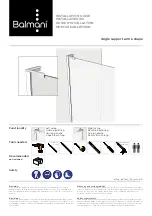
12
6. Connect the Bidet Hose to the Seat
Connect the plastic side of the bidet hose to the water inlet.
Hand-tighten to secure. Take care not to twist the bidet hose,
excessively bend it, or strip the plastic screw threads when
screwing the hose onto the bidet seat.
7. Attach the Swash to the Mounting Plate
a. Set the Swash flat on the toilet bowl in front of the mounting
plate, and slide seat onto plate until it is secure.
b. If the seat appears too short or too long for the toilet, adjust
the mounting plate accordingly. To adjust the mounting plate,
loosen the nuts underneath the toilet and slide seat forward
or backwards as needed. Once the seat is lined up properly,
tighten the nuts to hold in place.
8. Connect the open end of the Bidet Hose to the T-valve.
NOTE:
For those with mobility issues, we recommend our Swash 1400
or Swash 1000 bidet seats, as their mounting systems are engineered
for the most secure transitions from wheelchairs or walkers.
9. Turn On Water Supply
a. Open the main water supply valve slowly and check for leaks.
b. Wait 5 minutes, check again and, if there are no leaks, continue.
10. Plug the Power Cord into an electrical outlet. Nozzle will extend
and retract.
PRODUCT INSTALLATION
Swash Installation
c. Slide rubber cone washer, flat washer, and then nut onto
mounting bolts under the toilet bowl and tighten to keep
mounting plate in place.
Step 7
Step 6
Step 8
NOTES
•
Make sure to only use a grounded GFCI (Ground Fault Circuit Interrupter) electrical outlet. In
the case of a short circuit, a grounded GFCI outlet may help prevent electric shock or injury.
• If it is necessary to use an extension cord, only use those rated for a minimum of 15 amps
with a three-wire extension cord with a three-blade grounding plug.
11. Follow instructions on page 16 for using the Swash.














































